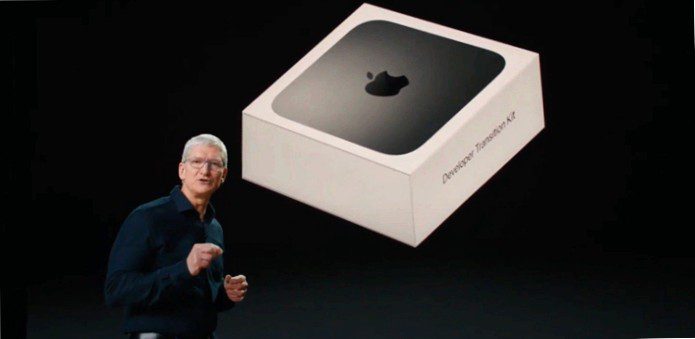The change to the ARM platform brings a problem: The current Macs are in some ways obsolete with it.

Now it’s final: within the next few years Apple will switch to Apple Silicon, which means a move from the Intel to the ARM64 platform. This is a sensation and will make Macs faster and more energy efficient. But we don’t want to discuss the technical background here, we reported about it yesterday in detail . The change brings namely a whole new problem for Mac users. A problem Apple didn’t address in yesterday’s keynote: Should you still buy a Mac with Intel CPU now?? There are still some in the pipeline, Tim Cook announced.
Apple wants to have completed the change in two years, then there are also iMacs and Mac Pro only with ARM CPU and also Macbooks only with Apple Silicon. For Macs with the old platform, however, Apple’s support with updates and new software from software vendors and services will then become increasingly sparse over the next few years.
For older users this sounds familiar, in fact Apple had already made a similar platform switch in 2006, the switch from PowerPC to Intel. However, this soon had consequences for the utility and also the actual financial value of the suddenly obsolete devices with PowerPC: If you still bought a Mac with PowerPC, you soon regretted it. The new Intel Macs were not only much faster, already in 2011 the new OS X 10 supported.7 Lion no more PowerPCs-Macs. A bit later, there were no more system updates and the formerly expensive G5 and G4 Macs were sold off on the second-hand market.
Problem: Endurance
If you still want to buy a Mac this year, you should keep an eye on the useful life. If you replace your Macbook annually or every three years anyway, you won’t be affected. Compatibility issues may not be expected for another four or five years. If you want to use your expensive iMac for the next five years, it will be critical. In this case, it might make sense for most users to wait for the next iMac generation with ARM CPUs.
Problem: Compatibility
But the decision will depend very much on the hardware and software you are using. You may use special peripherals or be a music professional who has invested a lot of money in audio hardware and software? How well USB devices that need drivers will work with the new platform is also not yet clear. Their current Mac software will probably run on the new platform without any problems. Thanks to technologies like Rosetta 2 and virtualization, Apple promises that older Mac applications will work smoothly and quickly.
Problem: Windows
However, another problem stood out during the presentation: When the new system was introduced, the Parallels Desktop virtualization software was shown, which many users use to run Windows on the Mac. However, to our surprise, Parallels did not virtualize Windows but Linux under Apple Silicon. It could be that the Intel version of Windows will not run at all under Apple Silicon, or only very slowly. But here Parallels is silent for the time being .
Bootcamp might not continue to work either. Bad news for users of industry software, such as finance. Many companies also seem to use Macs with Windows as operating system, this is then simply not possible anymore. The fact that Intel Macs were accepted so quickly was perhaps also due to the good support of other operating systems such as Windows but also Linux. This may require an ARM version of Windows, but users of the first ARM Macs will probably be trying this out soon. Finally, there is a small consolation for owners of an Intel Mac: If there is no more support from Apple, their computer will still be usable under Linux and Windows for a very long time.
Conclusion
Should you still buy a Mac? For the home user, this is not an issue for now, your Intel Mac won’t cause any problems for the next few years – the first generation of ARM Macs on the other hand might. For businesses and self-employed people who want to use their Mac for the next five years, however, this becomes a problem. It is better to postpone major investments until more information about software compatibility and Windows support is available in the next weeks. The first test devices will be delivered to developers this week and we expect some surprises in the next weeks.